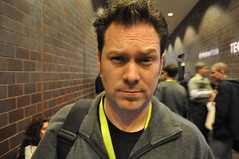 Most community managers know that the discipline has worth (i.e. significance) – our experience shows us that communities without community managers are much more likely to die off, go off track, become thorny stews, or get so insular that they can’t grow or evolve. For sponsoring organizations who want something fairly specific to result in their community initiative then, not having community management comes with some degree of risk. No one expects the Spanish Inquisition, after all – or for your employees to stick cheese up their nose and post the video to YouTube or whatever your community members decide to do next. Not having someone on top of that can lead to some unexpected surprises. So having a community manager is definitely worthwhile.
Most community managers know that the discipline has worth (i.e. significance) – our experience shows us that communities without community managers are much more likely to die off, go off track, become thorny stews, or get so insular that they can’t grow or evolve. For sponsoring organizations who want something fairly specific to result in their community initiative then, not having community management comes with some degree of risk. No one expects the Spanish Inquisition, after all – or for your employees to stick cheese up their nose and post the video to YouTube or whatever your community members decide to do next. Not having someone on top of that can lead to some unexpected surprises. So having a community manager is definitely worthwhile.
However, much less work has been done on analyzing the value (i.e. financial benefit) of community management. This is partly due to the maturity of understanding the value of online communities in general and partly due to the fact that it is almost impossible to run a scientifically valid comparison of two communities because no two communities – or community managers – are the same. Taking one community without a community manager and comparing it to a community with a community manager will allow one to observe qualitative differences in behaviors but it is not an apples to apples comparison needed to get at a specific dollar value. Communities are complex systems that defy easy analysis.
Tom Humbarger is one of the few people who has done an analysis of community activity with and without a community manager and the activity drop off, while not a cliff, slows significantly in a fairly short amount of time.
I’ve included his chart here because it is a striking example but his post has more specific stats that are worth checking out. It’s one of the only examples I’ve seen of this type of analysis. To get at value you would have to compare changes in activity to changes in outcomes (support calls, online mentions – whatever the community’s prime purpose is) for various periods. Regardless, it’s easy to see the cost of community management against community activity and have a good understanding of what type of investment is needed to get the type of activity desired.
We are actively looking for others who have done some type of analysis on the value of community management – if you have a case study that you are willing to share – publicly or confidentially – we are looking to help community managers and executives understand how to think about the value of community management. Some approaches we are seeing to understand this value are social network analysis and systems dynamics modeling but both require an advanced understanding of the approach to effectively use.
We’re also going to tag a few community management experts here in the hope that they’ll contribute to the conversation and give their thoughts on how to assess the value of community management: Rawn Shah of IBM, Connie Bensen of Techrigy/Alterian, Ken Burbary of Ernst & Young, David Alston of Radian6, Erin Liman of SAP, Rachel Makool, Michael Brito of Edelman Digital, and Dawn Lacallade of SolarWinds.
If you are community manager, how do you think about and demonstrate the worth or value of your role? Please keep in mind, just because value cannot be assessed does not mean the investment is not a sound one. We invest in worthwhile things all the time – political campaigns, charities, sports, relationships – so we’re not suggesting every community management investment needs to be able to assess value but it is something that some communities will be able to track. For others, being worthwhile will be sufficient.



![Reblog this post [with Zemanta]](https://img.zemanta.com/reblog_e.png?x-id=510949b6-d0a6-435f-b49b-582fe232771e)

 Mark
Mark I’ve been friends with
I’ve been friends with ![Reblog this post [with Zemanta]](https://img.zemanta.com/reblog_e.png?x-id=2f2eb19c-b3c9-49aa-8d20-00c479f55487)
 I found Michael Brito (
I found Michael Brito (

